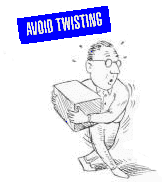How
to Prevent Back Injuries
The
best way to prevent back injuries is to develop habits that reduce the
strain placed on the back. There are some basic things you can do to
help.
1.
Avoid Lifting and Bending Whenever You Can
Anytime
you can spare your back the stress and strain of lifting and bending,
do so! If you don't use your back like a lever, you avoid putting it
under so much potentially damaging force.
Place
objects up off the floor. If you can set something down on a table
or other elevated surface instead of on the floor, do it so you won't
have to reach down to pick it up again.
Raise
/ lower shelves. The best zone for lifting is between your
shoulders and your waist. Put heavier objects on shelves at waist
level, lighter objects on lower or higher shelves.
Use
carts and dolleys to move objects, instead of carrying them
yourself.
Which
is better for your back:
Pushing
a cart or Pulling
a cart?
Use
cranes, hoists, lift tables, and other lift-assist devices whenever
you can.
2.
Use Proper Lifting Procedures
You
can't always avoid lifting, but there are ways to reduce the amount of
pressure placed on the back when you do so. By bending the knees, you
keep your spine in a better alignment, and you essentially take away
the lever principle forces. Instead of using your back like a crane,
you allow your legs to do the work.
Follow
these steps when lifting:
| 1.
Take a balanced stance with your feet about a shoulder-width
apart. One foot can be behind the object and the other next to
it.
2.
Squat down to lift the object, but keep your heels off the
floor. Get as close to the object as you can.
|
 |
| 3.
Use your palms (not just your fingers) to get a secure grip on
the load. Make sure you'll be able to maintain a hold on the
object without switching your grip later.
4.
Lift gradually (without jerking) using your leg, abdominal and
buttock muscles and keeping the load as close to you as
possible. Keep your chin tucked in so as to keep a relatively
straight back and neck line.
|
 |
| 5.
Once you're standing, change directions by pointing your feet
in the direction you want to go and turning your whole body.
Avoid twisting at your waist while carrying a load.
6.
When you put a load down, use these same guidelines in
reverse.
|
 |
Also
follow these lifting tips:
Reduce
the amount of weight lifted. If you're moving a bunch of books,
better to load several small boxes than one extremely heavy load.
Use
handles and lifting straps.
Get
help if the shape is too awkward or the object is too heavy for
you to lift and move by yourself!
Body
Management
It's
important to know your body's limitations, and it's important to be
aware of your body position at all times. Learn to recognize those
situations where your back is most a risk: bending, lifting, reaching,
twisting, etc. Then take measures to avoid an injury.
Stretch
first - If you know that you're going to be doing work that might
be hard on your back, take the time to stretch your muscles before
starting, just like a professional athlete would do before a workout.
This will help you avoid painful strains and sprains.
Slow
down - If you're doing a lot of heavy, repetitive lifting, take it
slowly if you can. Allow yourself more recovery time between lifts, as
well. Don't overdo it.
Rest
your back - Take frequent, short (micro) breaks. Stretch. If
you've ever been working in an awkward position for a long time, then
stood up and felt stiff and sore, you know you've been in that
position too long, and your body is now protesting. Taking a one
minute stretch break every now and then can help you avoid that.
Sleep
on a firm mattress. - Also, the best sleeping position for many
people is either on the back with the knees slightly elevated (by a
pillow), or on the side with knees slightly bent.
Get
in shape - Strengthen your stomach muscles, lose a little weight,
increase your flexibility.

[Intro]
[Why?]
[Causes]
[Prevention]
[Exercises]
[Quiz]
Lifting procedures and cartoons copyright Parlay
International
